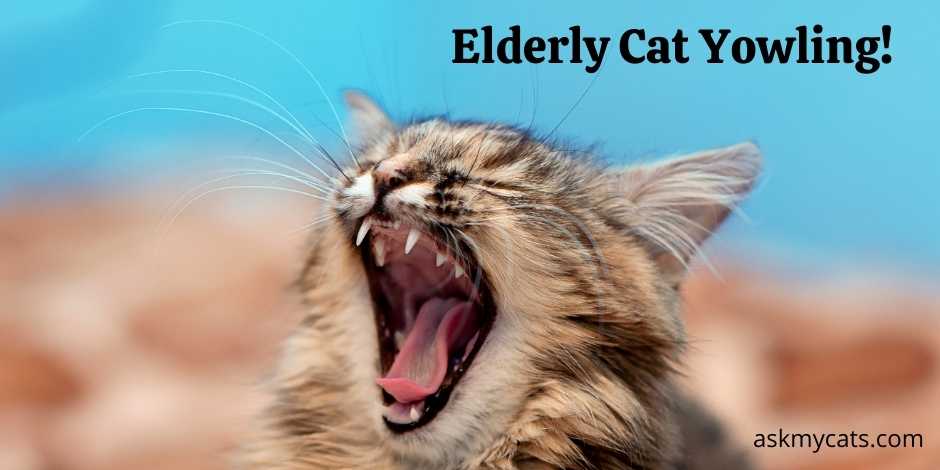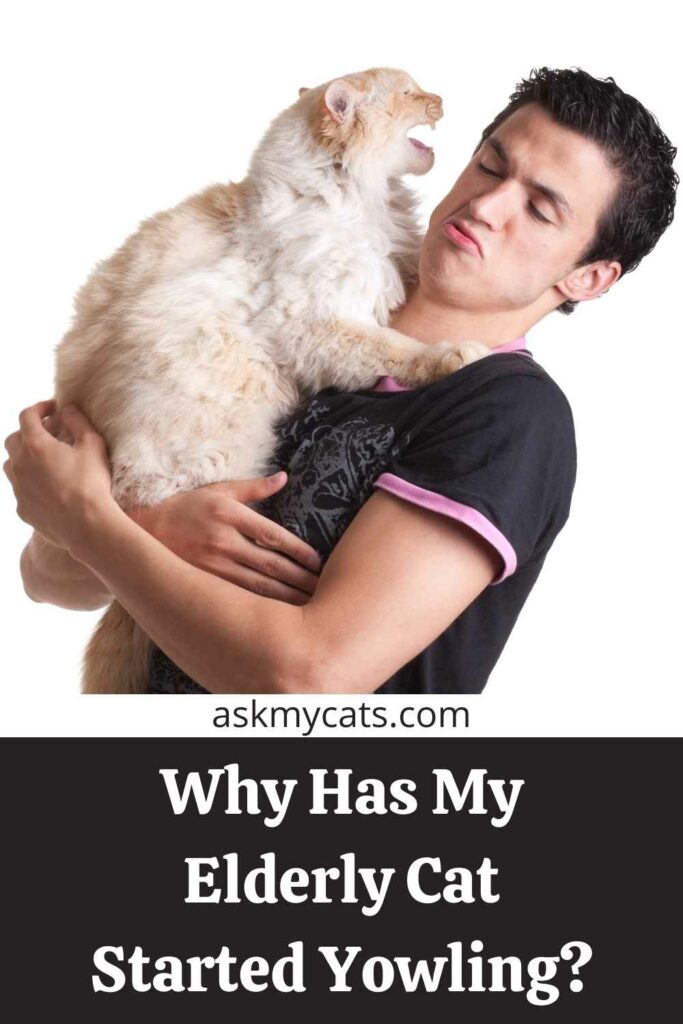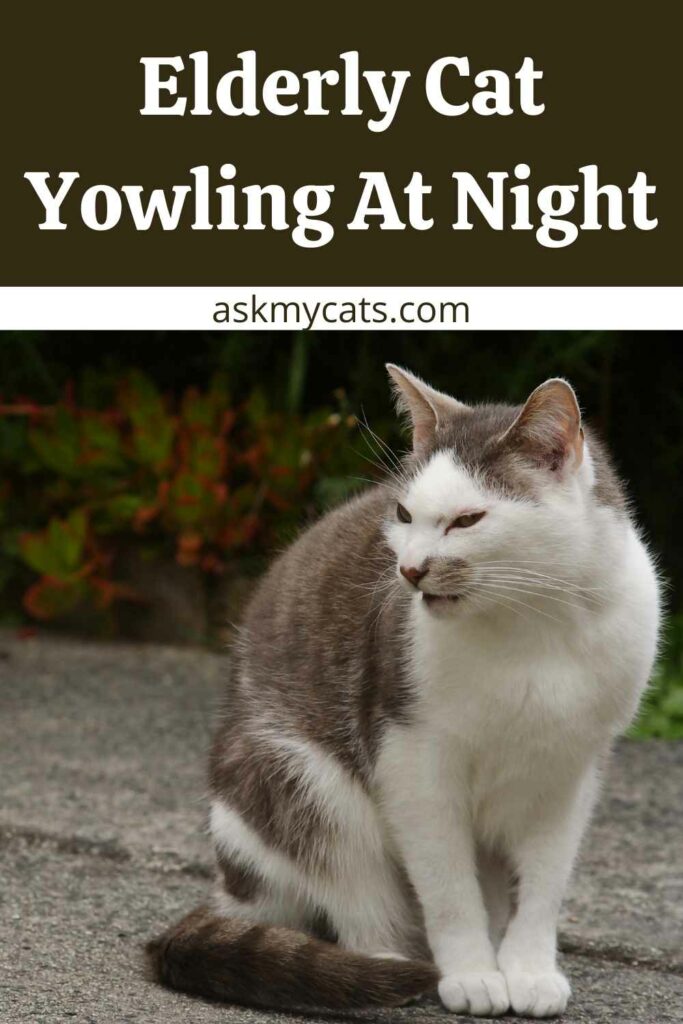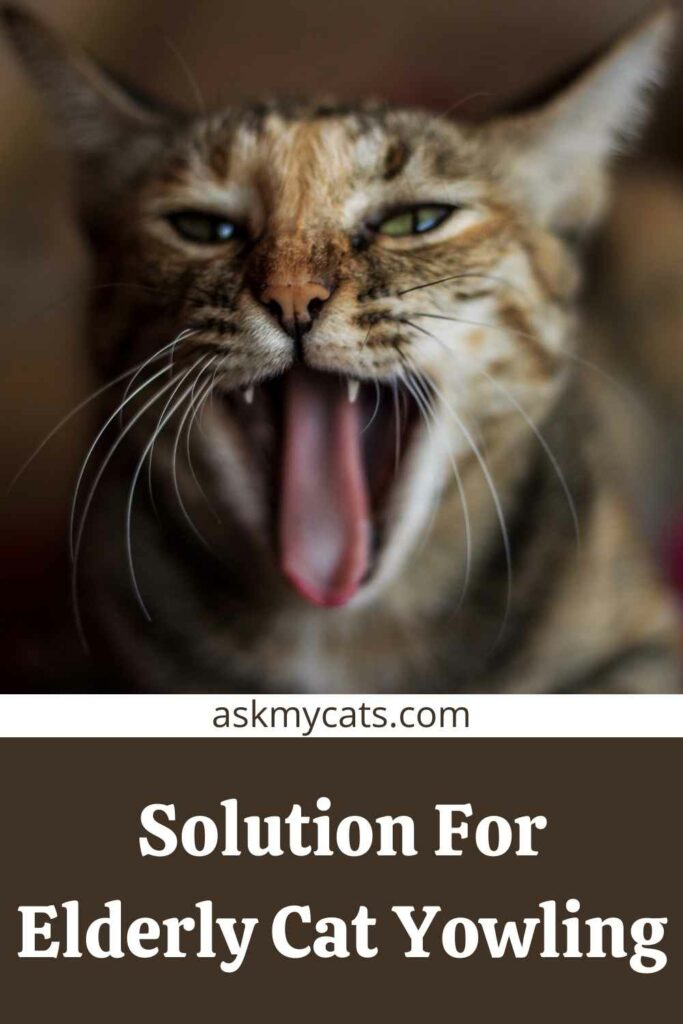Cats can start yowling after they reach the age of roughly 8 years old. This isn’t like the purring, chirping, and persistent meowing they’ve been doing their whole lives while sitting next to an empty food bowl. It doesn’t appear that this yowl is an attempt to communicate with you. It appears to be as aimless as the roaming cat.
When cats become older, it’s mainly due to health problems that cause discomfort and they start yowling. Your cat might be suffering from hyperthyroidism, sensory degeneration, or cognitive problems. Cats with dementia, in particular, are more prone to yowl at all hours of the night.
Cats sometimes have strange mannerisms as they become older. Senior cats, for example, frequently begin yowling in the middle of the night for no apparent reason. The continual wailing, meowing, and howling might be a nuisance. That’s especially true if you’re not sure why your cat is acting the way it is.


Give Your Cat the Perfect Day
Get the Free Ebook!
Why Has My Elderly Cat Started Yowling?
Yowling is a sign that your elderly cat is hungry, thirsty, or even in pain.

If your cat is exhibiting other symptoms of disease such as a change in food or behaviour (lethargic or too aggressive mood) it may be time for a veterinarian examination.
Cats of any age, but especially the old, can have health concerns. Unfortunately, if your cat is yowling incessantly, this isn’t good news.
It is totally natural for health difficulties to accompany age. Many older cat owners, on the other hand, are taken aback when their beloved cat begins to meow excessively and are unsure what to do.
Yowling is a protracted, distressing wail of agony or sadness. When cats are disturbed, such as from starvation, separation anxiety, or having their territory invaded, they produce this sound.
Of course, treating the symptoms of these illnesses might help your cat relax. Although many of the problems are curable, there is no treatment for feline dementia. If you don’t treat your cat, you’ll continue to have restless nights.
The most common diseases for elderly cats to look out for include:
- Hypertension (high blood pressure)
- Hyperthyroidism
- Central nervous system diseases (tumors)
- Dementia, confusion
Cats are natural charmers. They’ll go to any length to attract your attention. They’ll start meowing as though they’re attempting to call your name when they’re hungry.
When it comes to needing attention, senior cats are very outspoken. They are more insecure than younger cats, and they are more prone to ring the bells when they want assistance.
You need to spend more time with your cat in order to give him the attention he deserves. If you don’t, they’ll become irritated and start reminding you that they’re still around. Consider yourself fortunate if this is the cause of your cat’s yowling and spend extra time with them.
Yowling might sometimes be triggered by pain your cat is experiencing.
We’re talking about bodily discomfort here. When a cat’s health begins to decline, they will develop illnesses and disorders that are common in senior cats.
These include:
- Arthritis
- Dental Diseases
- GI and UTI pain
- Neurological pain
There are a variety of reasons why your cat may be in discomfort. They just aren’t as nimble as they used to be as they become older. Injuries are also prevalent, especially in cats suffering from arthritis.
They may become outspoken about their discomfort if it becomes unbearable. You might be able to alleviate the pain and make your cat more comfortable with correct care. If you tell your veterinarian about it, he or she may prescribe pain relievers as well as other treatments.
Cats are famed for their keen sense of smell. Their hearing and smelling abilities are superior to ours.
Their sensory abilities might deteriorate dramatically as they get older.
Elderly cats, in our experience, will begin to express their dissatisfaction with this. They will begin to yowl excessively, similar to an aged person, because they are unable to hear their own meowing.
It’s like an elderly person yelling because they can’t hear.
In older cats, deafness is unavoidable. It affects more than 80% of senior cats all over the world; therefore your cat is not an exception.
In such circumstances, there isn’t much we can do. The easiest method to deal with this situation is to console the cat. Cuddle with it frequently, spend quality time with it, and prepare a tasty dinner for them.
Even if your cat’s sensory faculties have been compromised, it still wants to be the centre of attention.
Why Do Old Cats Yowl So Much?
Old cats yowl excessively because they are stressed about something.
Although uncommon, regular yowling might indicate that your cat is stressed.
After everything you’ve gone through together, you don’t want to put your ageing cat through any more hardship!
A new pet, particularly a new cat, might be the source of the yowling. Make sure the cat is as relaxed as possible and doesn’t have to deal with any stress.
You may have to accept it if their health deteriorates too severely. It will be difficult for a while, but every cat owner has to go through this.
Contacting your veterinarian is the recommended course of action. They’ll examine your senior cat and attempt to figure out what’s causing the excessive meowing. Hopefully, there is still hope for your cat, and the yowling may be addressed.
Elderly Cat Yowling After Eating
If your old cat yowls a few minutes after eating, it might be sick.
Hyperthyroidism, renal illness, and uremic gastritis, for example, can cause:
- Cramps
- Indigestion
- Irritability
Your cat will yowl in response to these symptoms. Since some cats yowl for food, it’s critical to offer adequate food and water to prevent nighttime meowing. Hyperthyroidism, for example, might cause your cat to be always hungry due to an elevated metabolism. If this is the case, your cat will yowl incessantly until you offer it something to eat.
Elderly Cat Yowling At Night
If your elderly cat is yowling at night, it means he is not able to sleep and wants to draw your attention.

It may appear that your elderly cat is screaming for no apparent reason. Because you can’t sleep, if this happens at night, it will be much more persistent and obvious. Always remember that there is a triggering factor.
Hyperthyroidism is a dangerous disorder that affects the thyroid glands and causes them to generate an excessive amount of the hormone thyroxine. This is a prevalent ailment in senior cats.
Hyperthyroidism is the most frequent feline endocrine condition, according to the Journal of Feline Medicine and Surgery. It is estimated that 10% of older cats will develop it.
Hypertension is more prone to occur in an elderly cat with hyperthyroidism. However, a cat might become hypertensive as a result of another condition.
Cats with high blood pressure scream and howl all the time, regardless of the cause. As a result, during the diagnosing stage, you should ask your veterinarian to check your cat’s blood pressure.
As your cat gets older, it will unavoidably lose some of its senses. Cats lose their vision, sense of smell, and even hearing as they age. Because of the disorientation, they may start wailing and vocalizing incessantly. The loss of sensory capabilities and capacities causes howling, which is a sign of anguish.
Joint discomfort and aching muscles are common in senior cats. Arthritis and other bone-related problems can occur in certain elderly cats. These disorders might now be rather uncomfortable. If you don’t treat your cat, he or she will start howling nonstop all day and night.
As your senior house cat’s sensory abilities deteriorate, he or she is more prone to get cognitive dysfunction syndrome. Some cats, in particular, acquire a feline type of Alzheimer’s disease and dementia, and their cognitive function deteriorates as they get older.
Your elderly cat may begin to exhibit repeated behaviours such as pacing the floor or forgetting to eat when their bowl is near. The cat will howl incessantly at night as a result of this.
As your cat gets older, it may develop neurological problems, as well as brain and spinal cancers.
In cats with neurological and nervous system diseases, nighttime behaviour abnormalities such as howling, yowling, and wailing are typical.
Solution For Elderly Cat Yowling
You can provide your elderly cat some food and water and make him feel comfortable to stop yowling.

Excessive yowling in the middle of the night can be aggravating. That is especially true if you are unsure about how to proceed. Fortunately, there are actions you can do to assist your cat in settling down for the night and feeling better in the first place.
The greatest method to deal with a problem is to figure out what’s causing it. A cat vocalizing at night may appear normal at first, but if the yowling continues, it may indicate a more serious problem.
If your cat isn’t yowling at night due to a physical condition, it might be hungry or thirsty. Some cats meow at night in the hopes that you would wake up and feed them. This is especially true if you don’t feed your cat according to a set schedule. Providing basic necessities such as food and water will assist to decrease the intrusive nightly calls.
Because of the underlying diseases that occur with age, elderly cats are more likely to yowl. You may, however, lessen the noise by ensuring that your senior cat is as relaxed as possible.
To begin, keep the cat’s bedding warm and clear of draughts. If your cat’s vision is deteriorating, try putting nightlights to assist it in navigating the dark.
Cats are typically quite busy at night. Keeping your cat indoors if it prefers the outdoors will make it feel imprisoned. This will result in a lot of yowling at night. Consider installing a cat flap to allow your cat to enter and exit your home without being disturbed.
If none of the above methods work and your cat continues to yowl at night, it’s time to take your cat to the vet. The specialist will not only look for concerns like cognitive impairment and hyperthyroidism in the cat.
A veterinarian will also be able to advise you on how to keep your senior cat peaceful at night.
Frequently Asked Questions
Why Do Cats Yowl After Pooping?
There are two primary reasons why your cat may yowl after pooping. It’s possible that your cat has a digestive issue and is having difficulty pooping, resulting in the yowl. Another cause might be that its litter box is full and has to be de-loaded and replaced. Your cat, after all, will not abide the stench of its own faeces.
Do Cats Yowl When They Are Bored?
Our feline companions definitely have feelings, and they might be lonely or bored at times. Your cat may claw your costly furniture, rip out its fur, lick itself repeatedly, meow persistently, and engage in other repetitive actions to release negative energy.
Do Cats Yowl When In Heat?
When female cats are in heat, they frequently caterwaul and yowl. Female cats do this to communicate with any male cats in the area. Male cats will yowl in response, indicating that they have heard the call. The female will continue to yowl until she finds a suitable mate.
Final Words
It’s very natural for your cat to yowl excessively and wake you up in the middle of the night. Many senior cats experience this, especially when they lose their hearing or vision.
The easiest approach to deal with it is to contact your veterinarian and speak with them; ideally, they will be able to assist you in extending your cat’s senior years.
Leave your questions in the comments section below.
